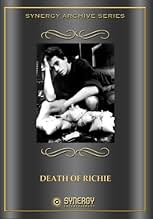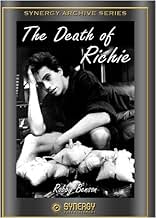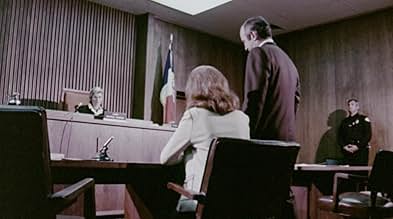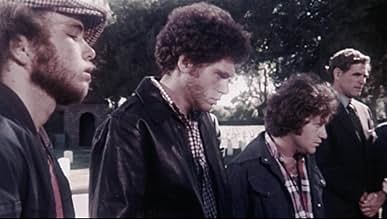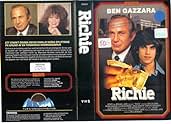Adicionar um enredo no seu idiomaA sensitive but confused teenager feels pressure on him from all directions and turns to drugs, which causes problems for him in school and at home.A sensitive but confused teenager feels pressure on him from all directions and turns to drugs, which causes problems for him in school and at home.A sensitive but confused teenager feels pressure on him from all directions and turns to drugs, which causes problems for him in school and at home.
- Direção
- Roteiristas
- Artistas
- Morris Polk
- (as Herbert Voland)
- Direção
- Roteiristas
- Elenco e equipe completos
- Produção, bilheteria e muito mais no IMDbPro
Avaliações em destaque
The drug culture was still relatively new in the 70s and so parents were generally ignorant of the pitfalls thereof, which explains why the parents wait too long to tackle Richie's drug problem by sending him to rehab or whatever. The movie illustrates how teens are drawn into the druggie lifestyle via hanging around the wrong crowd and the corresponding peer pressure. As they say: "Bad company corrupts good character." Mr. Werner should have banned Richie's drug-inclined buddies from his property WAY before he does, not to mention get him hooked-in with a serious counseling program.
Of course not everyone who turns to drugs for recreation turns out like Richie and the movie never suggests this, but it does convey that the misuse of chemicals is a generally negative road and SOME personalities, for whatever reason, can't handle them because they have no sense of moderation and in some cases morph into psychos, like Richie. It's like alcohol: I rarely drink but, when I do, it makes me happy and pleasant. Yet I know people who become meaner than a junkyard dog when they drink. It depends on the personality in question. These types have to stay away from recreational drinking & drugs altogether.
"The Death of Richie" isn't as good as "Go Ask Alice" (1973), but it's still a potent 70's anti-drug flick. The movie shows Richie's potential and how he was actually a nice, respectful boy when he was sober. There are coming-of-age elements but, unfortunately, this is a story about coming-of-death and it's just grueling and sad.
In real-life, the father, George Diener, died of cancer about 9 years after he killed Richie in April, 1981, at the too-young age of 52. Richie's friend Brick in the movie was Lenny Langone in real life; he died on August 25, 2010. He was with Richie 15 minutes before the killing and to his dying day defended Richie as "too effed up" to be a threat to anyone and insisted that his father was a cold bastage looking for the right moment to kill Richie and legally get away with it. What he doesn't tell you is that Richie came at his dad with a friggin' ice pick and Lenny wasn't present during the encounter. It's easy to defend a drug-addled wacko with an ice pick when you're not the one being threatened.
THE MOVIE RUNS 1 hour, 37 minutes and was shot at Warner Brothers Burbank Studios, California. WRITERS: John McGreevey wrote the teleplay based on Thomas Thompson's book.
GRADE: B-/C+
Having lived with a drug using younger brother and then doing volunteer work in the field of adolescent substance abuse, the twists and turns of this story are sadly all too familiar. Drug treatment protocols and interventions have progressed since the 70's so it was frustrating to see the system not coping enough to get Ritchie the help he needed.
The three lead actors: Ben Gazzara as the father Ben Werner and Eileen Brennan as mother Carol Werner and Robby Benson as Ritchie were superb. Having been a frequent witness to the many and varied desperate attempts that parents make to get their child off drugs, I think that Gazzara and Brennan did a fabulous job in portraying the massive roller coaster ride and the sheer desperation that parents feel in these situations.
Robby Benson had already played a string of quite emotionally intense roles as a teenager (Jory, Jeremy, Death Be Not Proud and his most famous being Ode to Billy Joe) but his performance as Ritchie was worthy of an Oscar nomination had this been a big screen movie as he portrays all of the powerful and complex conflicted emotions at play with a boy stuck where he ended up. Addicts often cycle between manic good behavior patches where they try and be clean and then they relapse and crash. In one of those clean positive phases, Ritchie sells raffle tickets to almost everyone he meets in a mall parking lot. Benson excellently portrays the gangly awkwardness of that age and the energy that only really excited and focused teenage boys can put out. Benson played a ton of roles in the '70's where girls easily fell for his doe eyed sensitive charm so it took some acting for a dreamboat kid to play someone who struggled to talk to girls.
Robby Benson by then was a big teen idol courtesy of dazzling eyes, model quality looks and not inconsiderable athleticism (that was on display in a string of movies after Ritchie) but he never could break through with lead roles in big movies because he seemed to have been pigeonholed as just a heartthrob. His performance in Ritchie was akin to Leonardo deCaprio's breakout role in What's Eating Gilbert Grape from which he springboarded to a string of A list roles.
Você sabia?
- CuriosidadesRiffed in January 2025 for Rifftrax by MST3K alums Kevin Murphy, Michael J. Nelson and Bill Corbett.
- Citações
Sheila: [reading from paper at gravesite service] To us you will exist in the flowers, in the trees, and in all the things of nature that God has given us. Richie, you are now in a world of peace and happiness forever. Pray for us as we pray for you. And somewhere, sometime, we will join you. With love from all your friends.
[she places flowers on Richie's casket and steps back]
- Versões alternativasThe original NBC telecast, of The Death of Richie in January, 1977, had Richie scream as his father kills him with the shotgun. The NBC Censors thought this was too intense, and edited the scream from all subsequent showings. This sound-byte is not available on any DVD prints or current editions of the movie and is presumed "lost", to the point where today's audiences (and even those who saw reruns of the film on television) are completely unaware that such sound-byte did occur in the film.

